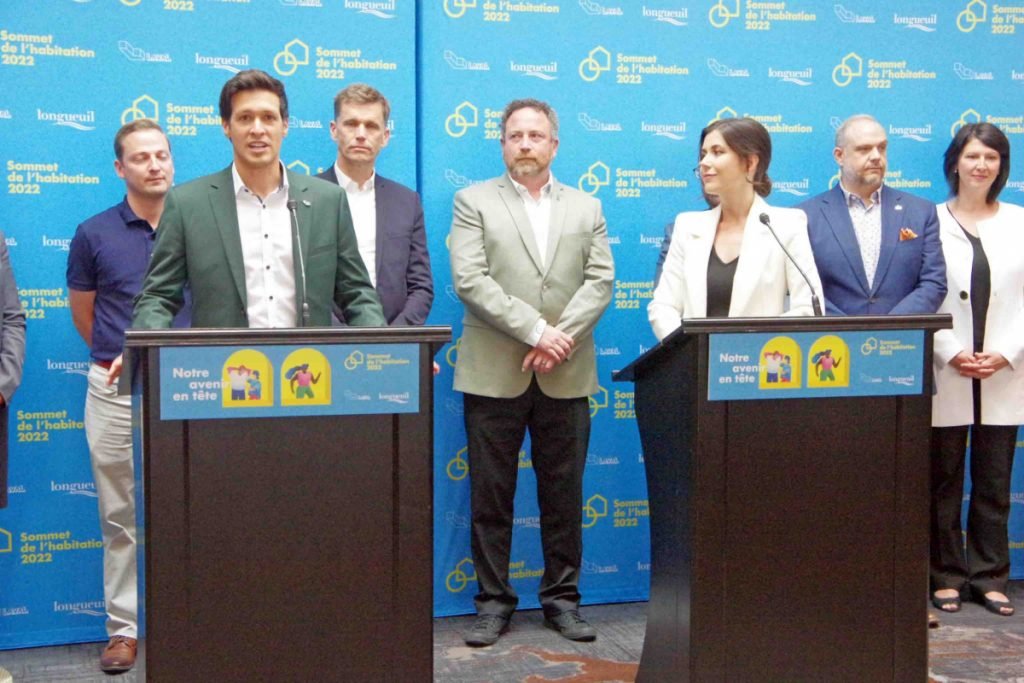It’s ‘necessary to tax undesirable forms of behavior,’ says Mayor Stéphane Boyer
Taxing property speculators who buy land and wait for it to increase in value without developing it was one of the solutions to the housing crisis raised by Laval mayor Stéphane Boyer at the beginning of the first Housing Summit held jointly by the cities of Laval and Longueuil at the Laval Sheraton on Aug. 26.

“I learned in the courses I took in economics that it was necessary to tax undesirable forms of behavior,” Boyer said in opening remarks addressed to the 400 elected and non-elected representatives, as well as academics and housing activists, from towns and cities from all over the province.
Make them pay, says Boyer
“So, why shouldn’t we make those who own lands but who don’t build pay?” he said, while adding that these property owners often apply for and obtain municipal zoning changes, which cause the value of their lands to further increase. “Only this doesn’t create employment and it doesn’t fix the problem of a lack of housing,” said Boyer.
Among other things, Mayor Boyer proposed that a special tax also be imposed on the owners of vacant housing units, which often are being held for investment reasons alone without serving their intended purpose.
Also considered during the summit was a proposal to increase the capital gains tax on the sale of secondary or third homes by a single owner. The additional funding coming from this would be used to help first-time buyers purchase homes.
Tax on speculation expected

Real estate investors in Laval can soon expect to see at least one immediate result of the day-long exercise: The City of Laval pledged in a collective statement issued by the participating municipalities to implement a new tax on real estate speculation to help finance new affordable housing initiatives.
The City of Longueuil pledged to bring together strategic levers to encourage moderate and diversified densification on its territory. As it is, the chronic lack of housing that is currently afflicting Quebec and many other areas of Canada and North America was high on the day’s agenda.
The situation is such that low vacancy rates, soaring rents and increasing home values are pushing many people, including those in the middle class, out of the home ownership market.
Addressing the housing crisis
One of the issues that many of those taking part in the Housing Summit insisted ought to be addressed is a lack of affordable housing units. Tens of thousands of units are needed across Quebec, although there is no clear course of action as to how this can be accomplished quickly.
At the end of the day, following a half-dozen detailed presentations on housing issues, Mayor Boyer and Longueuil mayor Catherine Fournier, along with the mayors of the 10 largest cities in Quebec, adopted a declaration reflecting their common concerns and interests in the housing crisis, while calling on Quebec to take immediate and drastic action.
‘Why shouldn’t we make those who own lands but who don’t build pay?’
The towns and cities committed themselves to contributing over the coming years to new and innovative projects to increase access to affordable housing and to adopt the resolution at the local level in municipal councils.
Municipalities’ commitments
The City of Montreal pledged to produce a non-profit project that would create 200 housing units that are 100 per cent affordable on the site of the former Blue Bonnets horse raceway in Côte des Neiges.
In an interview with the Laval News, Mayor Boyer said the purpose of the summit was two-fold. “To mobilize people and to inspire people,” he said. “In terms of both, I think we can say mission accomplished.”

He noted that representatives from all the important sectors involved with the issue, including the federal and provincial governments, the private sector and the non-profit sector, participated. In addition to the 400 in-person participants, 900 more took part online.
Much work to be done
“In terms of inspiring people, there were several solutions that were put forward,” Boyer continued. “Some were in terms of laws and by-laws. Others were fiscal. There were also strategies that cities can implement, as well as business models that are different and that cities can use.”
He said all the cities that signed the declaration, including Laval, stand committed to carry out their projects. As well, the Union des Municipalités du Québec has been asked by the towns and cities to monitor the progress of the project so that the best practices stemming from them can be shared among the members.



